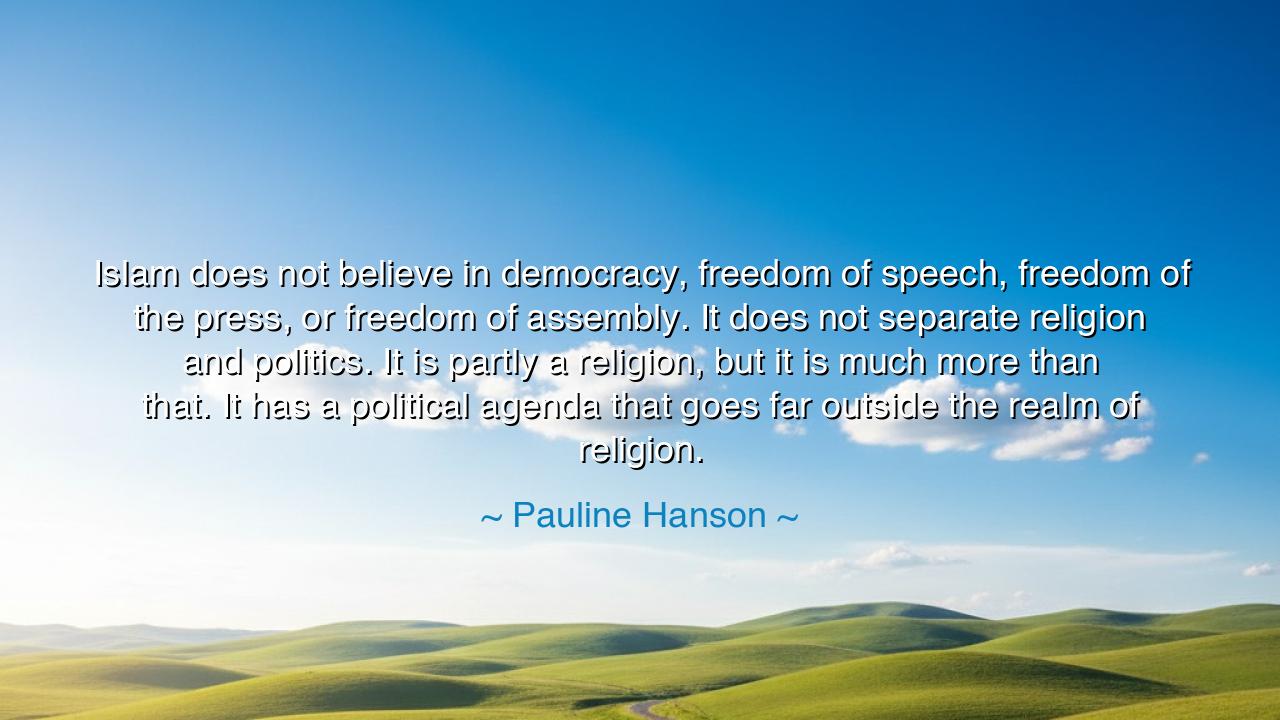
Islam does not believe in democracy, freedom of speech, freedom
Islam does not believe in democracy, freedom of speech, freedom of the press, or freedom of assembly. It does not separate religion and politics. It is partly a religion, but it is much more than that. It has a political agenda that goes far outside the realm of religion.






In the vast expanse of human history, religion has been a powerful force—guiding individuals, shaping civilizations, and often intertwining with political structures. Pauline Hanson’s words, spoken with stark clarity, offer a profound commentary on the nature of Islam, a faith whose influence stretches beyond mere spiritual practice into the realm of politics. She asserts that Islam is not simply a religion, but a way of life, one that encompasses not only spiritual teachings but also a political agenda that has, throughout history, sought to shape the societies in which it exists. In this, she calls attention to the relationship between religion and politics, a relationship that many religions, particularly Islam, maintain in ways that are not always evident in more secular belief systems.
The wisdom of the ancients teaches that no religion exists in a vacuum, separate from the societies that follow it. In the ancient world, religion was often the bedrock of governance and social order. The pharaohs of Egypt were seen not only as kings but as living gods, their divine authority extending to the political and military domains. Similarly, the Roman Empire embraced Christianity not only as a faith but as a means of consolidating power. Christianity, in its early days, transformed from a persecuted sect into a religion that shaped the laws and morality of an empire. Islam, in its origins, was similarly intertwined with political power, as Prophet Muhammad was not only a spiritual leader but also a political and military figure, guiding the Muslim community in both faith and governance.
Indeed, Islam has always been more than a religion. It is a comprehensive system that governs not just the relationship between humans and the divine but also how societies should be structured. The Sharia, the law derived from Islamic teachings, provides guidelines for personal conduct, but it also has clear prescriptions for governance, justice, and political life. This is not unique to Islam; many religions in the ancient and medieval worlds sought to provide a framework for politics through religious principles. The Mosaic laws in Judaism, the Code of Hammurabi in Babylon, and the Roman legal system all intertwined religion and politics, seeking divine sanction for earthly rule. Pauline Hanson’s assertion, then, draws attention to a larger historical and philosophical discussion about the relationship between religion and political authority.
However, the challenge arises when this integration of religion and politics becomes contentious. In modern times, many societies have embraced the separation of church and state, following the example of the Enlightenment thinkers who sought to protect personal freedoms by separating religious institutions from the mechanisms of governance. The French Revolution, with its call for secularism and liberty, profoundly influenced Western thought, paving the way for democracies that were built on the separation of religion from politics. This vision of governance, as seen in the United States, has been instrumental in creating societies where individual freedoms, such as the freedom of speech, the press, and assembly, are protected, and where religion is expected to remain a private matter.
Yet, Islamic governance has not followed this model. Rather, it has embraced the idea that religion and politics must be inseparable. The caliphates of the past, from the Umayyads to the Ottomans, were both political and religious institutions. The Islamic State (ISIS), though a modern and extreme manifestation, reflects a historical desire to merge faith and governance. For these reasons, Hanson's critique resonates with those who see Islamic governance as a challenge to the liberal, secular values that many modern societies uphold. The idea that Islam presents a political agenda is not a new one but is deeply rooted in the way the religion has historically shaped the governance of Muslim-majority lands.
But there is a lesson here for us all, regardless of our beliefs. The ancient wisdom teaches that no single ideology—be it religious, political, or otherwise—should hold absolute power without being questioned. History has shown us the dangers of tyranny, whether it arises from political or religious institutions. We must always be vigilant to ensure that no system—no matter how sacred—becomes a tool of oppression. Religion, like politics, is meant to serve the people, not dominate them. In our modern world, where multiple belief systems and ideologies coexist, the challenge is to find ways to balance freedom of belief with the preservation of individual liberties.
As we move forward, we must honor the wisdom of the ancients who warned against the dangers of a single force—whether religion or politics—seeking to control all aspects of human life. In the age of the globalized world, we must strive for understanding and respect for the systems of governance that emerge from different cultures and histories, while also recognizing the universal need for freedom—the freedom to believe, speak, and assemble without fear of oppression. The balance between religion and politics is a delicate one, and it is the responsibility of each generation to ensure that neither becomes a tool of exploitation, but rather a source of enlightenment and justice for all.






AAdministratorAdministrator
Welcome, honored guests. Please leave a comment, we will respond soon